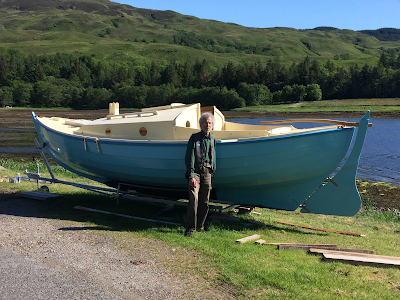Iain Oughtred was born in 1939 and grew up in Sydney. He was a shy child, who didn’t enjoy his studies, but from early on he developed a fascination with aeroplanes and boats and the science around them. He became involved in racing the National Gwen dinghies that were a feature of the scene on the Harbour. These were flat bottomed racing boats, designed in 1942, with a hull just twelve feet long, weighing just ten stone (63.5 kg), but with the foresail on a bowsprit and what Iain called a “shy spinnaker” set on a ten foot pole, giving them a massive sail area and requiring incredible skill to keep them from turning over. By the 1950s the postwar availability of new glues and synthetic sailcloth increased the performance, so that he claimed, in an article he wrote in 1958, that one had been timed at 23 mph in a “gale-like wind”. He built seven of them and became the class champion. His long term friends knew him as Isig, from the number on his sail created from black tape.
After working for several yacht designers, in 1964 the lure of the Swinging Sixties brought Iain to London, where he established his own practice in his own distinctive style. There was at that time a huge interest in self-built sailing boats, led by the Daily Mirror sponsoring Barry Bucknell’s Mirror Dinghy at the 1963 Boat Show. Iain knew that a self-build need not resemble a shoe box and started putting out drawings of hulls that were lovely as well as fast and seaworthy, accompanied by detailed building manuals, ensuring that anyone with the most basic skills could build one. His fascination with Viking designs led to his move to Scotland and then to Bernisdale on Skye, twenty three years ago. There he was truly in his element, working in his boat shaped drawing office and eventually reaching over a hundred designs. He’s best known for one of his last ones, for the community-built Scottish Coastal Rowing skiffs, with over two hundred in Scotland and almost the same number elsewhere.
Iain was a quiet, deeply spiritual person, who invariably put others before himself. He was reluctant to embrace the internet, preferring to develop a personal connection with his clients, always available to take a call to resolve a problem. His drawings were works of art, invariably sent with a handwritten note adorned with tiny sketches.
There is no easy way to leave this life, but it was a relief to know that Iain’s final few weeks were made as comfortable as possible in the brand new Broadford Hospital. His good friend and neighbour, Natalie Steele, had insisted on his being shifted from the back to the front of the building, with a view over Broadford Bay. As cards began to arrive from the boatbuilding and coastal rowing communities who owed him so much, and it turned out that one of the hospital staff was even building one of his boats, he was recognised as someone very special indeed. Although beyond the reach of any potential treatment, he was in no pain whatsoever, and so remained fully alert and cheerful.
In his final days Iain had visits from his son, Haig, over from Lisbon, and his brother David, from Hawaii (what an international family!), also from many friends within easier travelling distance. Then in the morning of 22nd February we got word that he had quietly passed away during the night.
I understand that, by the time you read this, a quiet Quaker service will have taken place on Skye. I suspect that his sailing and rowing friends here and abroad will organise their own events later in the year. And, to preserve his legacy, a group of friends, with the agreement of his family, will be setting up a small charity to ensure that his designs live on and continue to support the tradition, culture and skills of which he was such a keen advocate.











